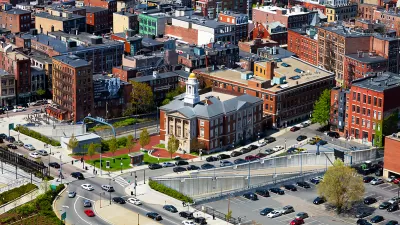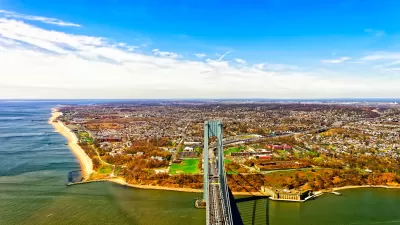Tom Acitelli has been following the intersection of congestion pricing and transportation in Boston, particularly as at affects transit. Noting the landmark agreement on cordon pricing reached in New York on Tuesday, he asks if Boston is ready.

On Feb. 26, Gov. Andrew Cuomo and Mayor Bill de Blasio announced that they agreed that congestion pricing should move forward in Manhattan's Central Business District, with the goal of passing state legislation in April.
"To be sure, there is no proposal at any government level as of late February to enact congestion pricing in Boston or the Boston area," writes Tom Acitelli, who, as editor of Curbed Boston, has been following congestion pricing since at least 2012. The controversial pricing strategy of charging motorists for driving into the downtown area has come up more often in the last year, with two prominent reports recently released showing the benefits of pursuing a plan like New York's MTA Transformation Plan:
-
On Feb. 21, a group of Massachusetts business leaders called A Better City, in consultation with the University of Massachusetts’ Donahue Institute released a "Transportation Finance Update" report identifying a projected $8.4 billion gap in Massachusetts transportation funding requirements between 2019 and 2028.
Among its recommendations, according to Acitelli:
- "[A]n increase in the frequency of tolls for drivers going in and out of the state and for those traveling around the Boston region on I-93 or I-95 (currently, they only get you with the tolls if you’re coming and going on I-90)."
- "[C]alls for congestion pricing in the Boston area via the all-electronic tolling (AET) already at the state’s disposal...For example, by implementing a system similar to London’s, a 5am–7pm weekday congestion charge of $5.00 imposed on major roadways crossing I-95/MA 128 could raise $2.9 billion over 10 years."
Additional user fees the report recommends, according to Bruce Mohl, the editor of CommonWealth magazine, "include raising the gas tax or applying the state sales tax to gasoline purchases; putting a price on the carbon contained in vehicle fuels; ... hiking the fees on ride-hailing apps to match T fares; and launching a vehicle miles traveled fee."
-
On Jan. 29, the Boston Green Ribbon Commission released its "Carbon Free Boston" report, laying out steps to help the entire city achieve carbon neutrality by 2050.
"Congestion pricing—charging motorists for driving into busier parts of the city at certain times—has long been controversial, but that might be one of the more easily implemented transportation changes necessary to making Boston carbon neutral," wrote Acitelli.
More polling
Maybe easy to implement, but it's the political challenge that has proven to be the most difficult hurdle. Last February, Acitelli reported on poll results that found that "38 percent of respondents want to see officials charge motorists for driving into the region’s busier areas during busier periods (a.k.a. rush hour). Some 55 percent oppose the idea."
That's actually quite a bit better than a January poll on attitudes towards a possible San Francisco cordon tolling plan taken by the San Francisco Chamber of Commerce, which opposes the plan, that found that "30 percent of San Franciscans backing the idea, and 65 percent rejecting it." And the Seattle Time Traffic Lab found only 26 percent supported a proposal there. Like the Carbon Free Boston proposal, it is included in Mayor Jenny Durkan's Seattle Climate Action plan.
Of the two recent reports promoting congestion pricing, this correspondent sees the Transportation Finance Update being more politically powerful as it draws parallels to the New York plan that is now advancing in that it is directly tied to desperately needed investment in public transit.
Related in Planetizen:
-
'Carbon Free Boston' Puts Priority on Land Use and Transportation Planning, January 31, 2019
- Boston Dedicated Bus Lanes Facing Funding Questions, January 11, 2019
-
After East Boston Toll Booths Were Automated..., December 16, 2018
-
The Millennials Who Came to Save Public Transit in Boston, October 29, 2018
-
Could Boston Join Seattle in Proposing Congestion Pricing? April 19, 2018
Hat tip to IBTTA SmartBrief.
FULL STORY: Boston congestion pricing: Will New York City’s move advance it?

Maui's Vacation Rental Debate Turns Ugly
Verbal attacks, misinformation campaigns and fistfights plague a high-stakes debate to convert thousands of vacation rentals into long-term housing.

Planetizen Federal Action Tracker
A weekly monitor of how Trump’s orders and actions are impacting planners and planning in America.

Chicago’s Ghost Rails
Just beneath the surface of the modern city lie the remnants of its expansive early 20th-century streetcar system.

Bend, Oregon Zoning Reforms Prioritize Small-Scale Housing
The city altered its zoning code to allow multi-family housing and eliminated parking mandates citywide.

Amtrak Cutting Jobs, Funding to High-Speed Rail
The agency plans to cut 10 percent of its workforce and has confirmed it will not fund new high-speed rail projects.

LA Denies Basic Services to Unhoused Residents
The city has repeatedly failed to respond to requests for trash pickup at encampment sites, and eliminated a program that provided mobile showers and toilets.
Urban Design for Planners 1: Software Tools
This six-course series explores essential urban design concepts using open source software and equips planners with the tools they need to participate fully in the urban design process.
Planning for Universal Design
Learn the tools for implementing Universal Design in planning regulations.
planning NEXT
Appalachian Highlands Housing Partners
Mpact (founded as Rail~Volution)
City of Camden Redevelopment Agency
City of Astoria
City of Portland
City of Laramie





























